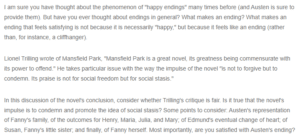The Phenomenon of “Happy Endings”
Mansfield Park’s ending is satisfactory. Typically, the novel ends with Edmund and Fanny’s marriage, with the two being as happy as they could have been. The couple moves into the parsonage on Mansfield Park and gains acceptance as family members, where Uncle and Aunt Bertram treat her well. The ending is seemingly portraying the point that good triumphs against evil. In this case, the good characters are Fanny and Edmund, while others, like Mary, Maria, and Julia, end up alone, married to a somewhat questionable person, or miserable. After all that Fanny has been subjected to because of her social status, she deserves to be rewarded with happiness, which is what the author has done.
The novel highly promotes social status. For this reason, the rich are honored and respected, while the poor are discriminated against. Throughout the book, the Bertram household members are determined against Fanny because she comes from humble beginnings. She is constantly reminded that she is an outsider to Mansfield Park’s lifestyle and social class, with characters such as Mrs Norris determined to make her feel bad about it. Additionally, places of living are discriminated against in the novel owing to their social status. Girls choose suitors depending on how wealthy they are. Once Penny declines her assured entry to a privileged social status after turning down Henry’s marriage proposal, she is sent back to Portsmouth, a region of poverty and negative encounters (Davidson, 2004). Essentially, Fanny’s return to her hometown is regarded as a penalty for rejecting a rich man’s proposal. As such, the ending is satisfactory because it shows that high social status is not everything and that happiness is possible even for low-income people. In other words, the characters got what they deserved in the end.
References
Davidson, J. (2004). A Modest Question about Mansfield Park. Eighteenth-Century Fiction, 16(2), 243-264.
ORDER A PLAGIARISM-FREE PAPER HERE
We’ll write everything from scratch
Question
I am sure you have thought about the phenomenon of “happy endings” many times before (and Austen is sure to provide them). But have you ever thought about endings in general? What makes an ending? What makes an ending that feels satisfying is not because it is necessarily “happy,” but because it feels like an ending (rather than, for instance, a cliffhanger).

The Phenomenon of Happy Endings
Lionel Trilling wrote of Mansfield Park, “Mansfield Park is a great novel, its greatness being commensurate with its power to offend.” He takes particular issue with the way the impulse of the novel “is not to forgive but to condemn. Its praise is not for social freedom but for social stasis.”
In this discussion of the novel’s conclusion, consider whether Trilling’s critique is fair. Is it true that the novel’s impulse is to condemn and promote the idea of social stasis? Some points to consider: Austen’s representation of Fanny’s family, of the outcomes for Henry, Maria, Julia, and Mary; of Edmund’s eventual change of heart; of Susan, Fanny’s little sister; and finally, of Fanny herself. Most importantly, are you satisfied with Austen’s ending?

